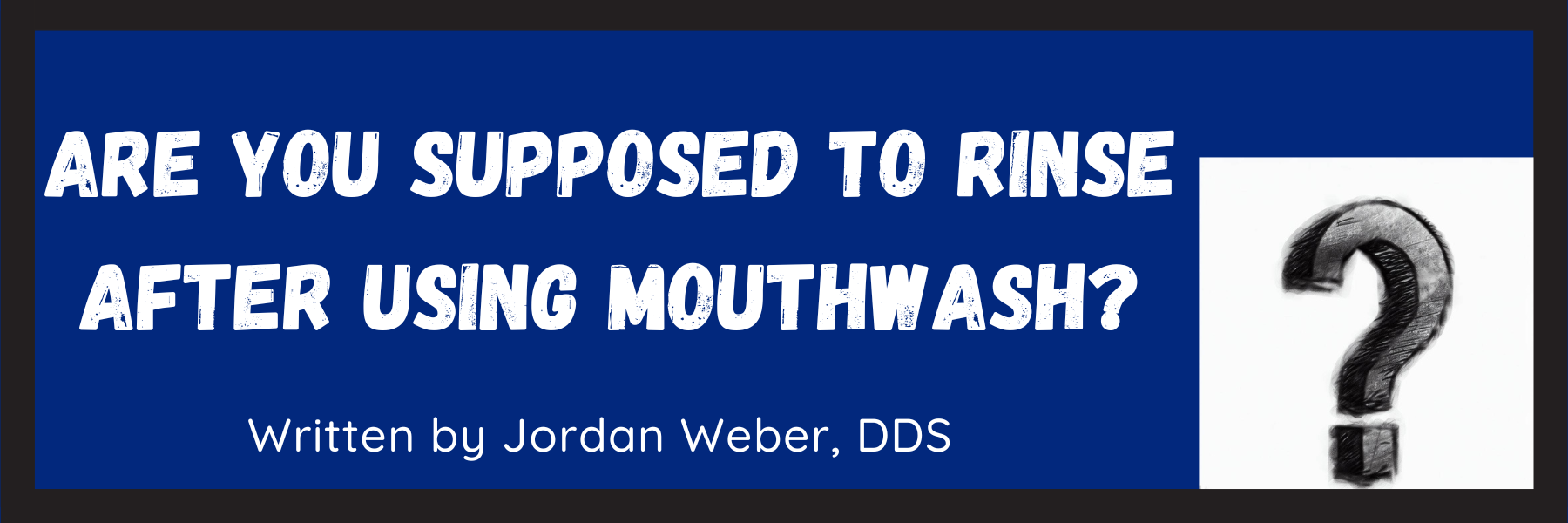For many, swishing mouthwash is a refreshing finale to their oral hygiene routine. This minty solution promises to get rid of bacteria, freshen breath, and deliver a clean that brushing alone might miss.
However, amid the bubbles and flavors, a question lingers for some people: is it necessary to rinse with water after using mouthwash?
To answer this question, we’ll take a look at the intended function of mouthwash and the best practices recommended by dental experts.
Mouthwash Instructions
Though this might sound overly simple, start with the bottle's label, where manufacturers outline proper usage instructions. Typically, instructions suggest pouring a measured amount, swishing it vigorously for a specific duration, and then spitting it out without following up with water.
Listerine, Crest Pro Health, and almost every mouthwash we’ve looked at will instruct you to spit out the mouthwash as a final step. In other words, do not rinse after using mouthwash.
Many mouthwashes (including TheraBreath and others) will also recommend that you wait 5-30 minutes before eating.
Adhering to these guidelines is crucial; the mouthwash is a blend of ingredients designed to maintain oral health when used as directed.
Reasons Not to Rinse
Why forgo the rinse? The answer lies in the chemistry of mouthwash.
Active ingredients — such as fluoride to strengthen enamel, or antiseptics to reduce bacterial growth — need time to bind to teeth and gums and perform their protective roles. Rinsing with water too soon washes these beneficial compounds away, curtailing their effectiveness.
In essence, mouthwash continues to act even after spitting it out, working to shield your smile long after its flavors have faded.
By sticking to the script — both on the bottle and from dental professionals — users can ensure they reap the maximum benefits mouthwash has to offer.
The Case for Rinsing
While the standing advice is to let mouthwash linger, there are instances where a follow-up rinse might be a wise idea.
Some users find mouthwashes with a high alcohol content or other potent ingredients to be too intense, causing discomfort or irritation. In such scenarios, a quick swish of water post-mouthwash can alleviate that fiery sensation.
Additionally, those with sensitive palates or specific oral health conditions might be directed by their dental care provider to moderate the impact of their mouthwash with a rinse, making the experience more pleasant and sustainable for daily use.
Expert Recommendations
When it comes to rinsing after mouthwash, dental professionals often adhere to a standard guideline: don't rinse. This is due to the fact that the prolonged contact of active ingredients with oral surfaces is beneficial.
However, this recommendation is not without its caveats.
Dentists recognize that each patient is unique and may require different care.
For individuals with special conditions or who are using therapeutic mouthwashes prescribed by a dentist, the directions may differ.
Thus, while the consensus leans towards not rinsing, experts agree that personal needs and the type of mouthwash used are important factors to consider.
Always check with a dental care provider for advice tailored to your specific oral health requirements.
Final Thoughts
Remember, the overarching consensus tilts towards not rinsing after swishing, to allow the active ingredients ample time to do their work. Yet, personal comfort and specific oral health needs take precedence — what works for the majority might not be the best for you.
Always read the labels on your mouthwash carefully, and don't hesitate to reach out to your dentist or dental hygienist for a personalized approach to your oral hygiene regimen.
FAQs
How long should you wait to rinse after mouthwash?
It is generally recommended to avoid rinsing your mouth with water immediately after using mouthwash. Many mouthwash products suggest waiting at least 30 minutes before eating, drinking, or rinsing to allow the active ingredients to work effectively.
Why do you have to wait 30 minutes after using mouthwash?
The 30-minute wait time after using mouthwash ensures that the active ingredients have sufficient time to act on the teeth and gums. This duration allows fluoride to remineralize enamel, antibacterials to reduce bacteria, and other therapeutic agents to provide the intended benefits without being immediately washed away.
Should you drink straight after using mouthwash?
Drinking immediately after using mouthwash is not recommended for the same reasons as avoiding rinsing — doing so can diminish the effectiveness of the mouthwash. Waiting at least 30 minutes before drinking is advisable.
Can I swallow my saliva after mouthwash?
Yes, it's natural to swallow saliva after using mouthwash; however, you should avoid swallowing the mouthwash itself. The act of swallowing saliva is normal and won't reduce the efficacy of the mouthwash as long as you're not also ingesting the product.
* Though the author of this post is a licensed dentist in the state of Kansas, this information is provided for informational and educational purposes only. Please use your best judgment and contact emergency medical services in the event of an emergency.


